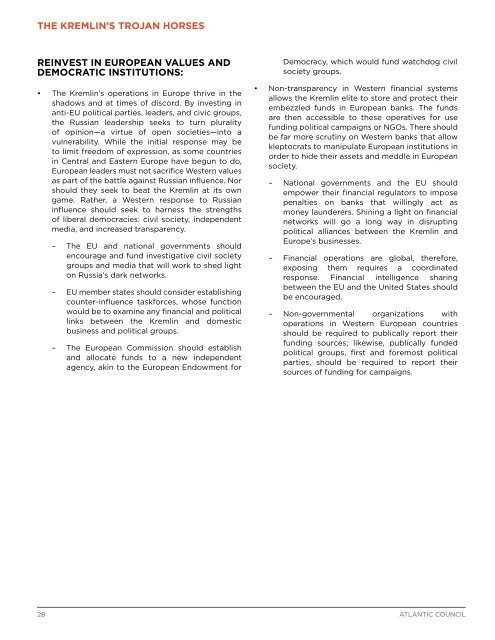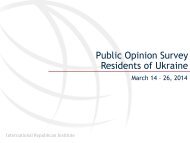Create successful ePaper yourself
Turn your PDF publications into a flip-book with our unique Google optimized e-Paper software.
THE <strong>KREMLIN’S</strong> <strong>TROJAN</strong> <strong>HORSES</strong><br />
REINVEST IN EUROPEAN VALUES AND<br />
DEMOCRATIC INSTITUTIONS:<br />
• The Kremlin’s operations in Europe thrive in the<br />
shadows and at times of discord. By investing in<br />
anti-EU political parties, leaders, and civic groups,<br />
the Russian leadership seeks to turn plurality<br />
of opinion—a virtue of open societies—into a<br />
vulnerability. While the initial response may be<br />
to limit freedom of expression, as some countries<br />
in Central and Eastern Europe have begun to do,<br />
European leaders must not sacrifice Western values<br />
as part of the battle against Russian influence. Nor<br />
should they seek to beat the Kremlin at its own<br />
game. Rather, a Western response to Russian<br />
influence should seek to harness the strengths<br />
of liberal democracies: civil society, independent<br />
media, and increased transparency.<br />
––<br />
The EU and national governments should<br />
encourage and fund investigative civil society<br />
groups and media that will work to shed light<br />
on Russia’s dark networks.<br />
––<br />
EU member states should consider establishing<br />
counter-influence taskforces, whose function<br />
would be to examine any financial and political<br />
links between the Kremlin and domestic<br />
business and political groups.<br />
– – The European Commission should establish<br />
and allocate funds to a new independent<br />
agency, akin to the European Endowment for<br />
Democracy, which would fund watchdog civil<br />
society groups.<br />
• Non-transparency in Western financial systems<br />
allows the Kremlin elite to store and protect their<br />
embezzled funds in European banks. The funds<br />
are then accessible to these operatives for use<br />
funding political campaigns or NGOs. There should<br />
be far more scrutiny on Western banks that allow<br />
kleptocrats to manipulate European institutions in<br />
order to hide their assets and meddle in European<br />
society.<br />
––<br />
National governments and the EU should<br />
empower their financial regulators to impose<br />
penalties on banks that willingly act as<br />
money launderers. Shining a light on financial<br />
networks will go a long way in disrupting<br />
political alliances between the Kremlin and<br />
Europe’s businesses.<br />
––<br />
Financial operations are global, therefore,<br />
exposing them requires a coordinated<br />
response. Financial intelligence sharing<br />
between the EU and the United States should<br />
be encouraged.<br />
––<br />
Non-governmental organizations with<br />
operations in Western European countries<br />
should be required to publically report their<br />
funding sources; likewise, publically funded<br />
political groups, first and foremost political<br />
parties, should be required to report their<br />
sources of funding for campaigns.<br />
28 ATLANTIC COUNCIL



